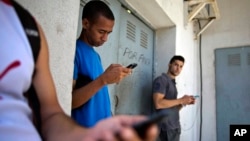The White House says a so-called "Cuban Twitter" communications network created by the U.S. government was a development program, not a covert operation.
White House spokesman Jay Carney commented about the program Thursday, responding to a report released earlier in the day by the Associated Press news agency. Carney said the program was completed in 2012.
Carney said the United States takes steps to be "discreet" when operating in "non-permissive environments" such as Cuba, in order to protect those involved in the program and the general public.
The AP report said the U.S. government secretly financed the social network in Cuba in an effort to stir political unrest and undermine the country's communist government. It said the U.S. Agency for International Development’s (USAID) program evaded Cuba's Internet restrictions by creating a text-messaging service that could be used to organize political demonstrations.
AP said it is unclear whether the project was legal under U.S. law, which requires written authorization of covert action by the president and congressional notification.
No comment
The Cuban government declined an AP request for comment.
The AP said details uncovered by its reporters appear to contradict USAID's longstanding claims it does not conduct covert actions. The report says the project could undermine the agency's mission to deliver aid to the world's poor and vulnerable, an effort that requires the trust and cooperation of foreign governments.
The report says the project, dubbed “ZunZuneo,'' slang for a Cuban hummingbird's tweet, was publicly launched shortly after the 2009 arrest in Cuba of American contractor Alan Gross. He was imprisoned after traveling repeatedly to the country on a separate, clandestine USAID mission to expand Internet access using sensitive technology that only governments use.
For more than two years, ZunZuneo grew and reached at least 40,000 subscribers. But documents reveal the team found evidence Cuban officials tried to trace the text messages and break into the ZunZuneo system. USAID told the AP ZunZuneo stopped in September 2012 when a government grant ended.
The AP says it obtained more than 1,000 pages of documents about the project's development, and independently verified the project's scope and details in the documents through publicly available databases, government sources and interviews with those involved in ZunZuneo.
White House spokesman Jay Carney commented about the program Thursday, responding to a report released earlier in the day by the Associated Press news agency. Carney said the program was completed in 2012.
Carney said the United States takes steps to be "discreet" when operating in "non-permissive environments" such as Cuba, in order to protect those involved in the program and the general public.
The AP report said the U.S. government secretly financed the social network in Cuba in an effort to stir political unrest and undermine the country's communist government. It said the U.S. Agency for International Development’s (USAID) program evaded Cuba's Internet restrictions by creating a text-messaging service that could be used to organize political demonstrations.
AP said it is unclear whether the project was legal under U.S. law, which requires written authorization of covert action by the president and congressional notification.
No comment
The Cuban government declined an AP request for comment.
The AP said details uncovered by its reporters appear to contradict USAID's longstanding claims it does not conduct covert actions. The report says the project could undermine the agency's mission to deliver aid to the world's poor and vulnerable, an effort that requires the trust and cooperation of foreign governments.
The report says the project, dubbed “ZunZuneo,'' slang for a Cuban hummingbird's tweet, was publicly launched shortly after the 2009 arrest in Cuba of American contractor Alan Gross. He was imprisoned after traveling repeatedly to the country on a separate, clandestine USAID mission to expand Internet access using sensitive technology that only governments use.
For more than two years, ZunZuneo grew and reached at least 40,000 subscribers. But documents reveal the team found evidence Cuban officials tried to trace the text messages and break into the ZunZuneo system. USAID told the AP ZunZuneo stopped in September 2012 when a government grant ended.
The AP says it obtained more than 1,000 pages of documents about the project's development, and independently verified the project's scope and details in the documents through publicly available databases, government sources and interviews with those involved in ZunZuneo.





